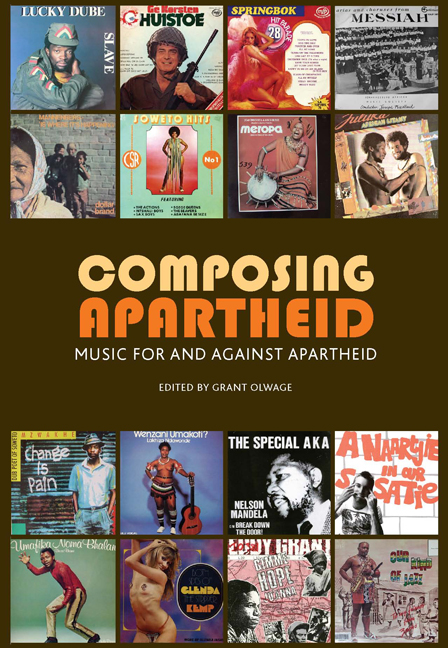Book contents
- Frontmatter
- Dedication
- Contents
- Acknowledgements
- Introduction
- Chapter 1 Back to the Future? Idioms of ‘displaced time’ in South African composition
- Chapter 2 Apartheid's Musical Signs: Reflections on black choralism, modernity and race-ethnicity in the segregation era
- Chapter 3 Discomposing Apartheid's Story: Who owns Handel?
- Chapter 4 Kwela's White Audiences: The politics of pleasure and identification in the early apartheid period
- Chapter 5 Popular Music and Negotiating Whiteness in Apartheid South Africa
- Chapter 6 Packaging Desires: Album covers and the presentation of apartheid
- Chapter 7 Musical Echoes: Composing a past in/for South African jazz
- Chapter 8 Singing Against Apartheid: ANC cultural groups and the international anti-apartheid struggle
- Chapter 9 ‘Nkosi Sikelel' iAfrika’: Stories of an African anthem
- Chapter 10 Whose ‘White Man Sleeps’ Aesthetics? and politics in the early work of Kevin Volans
- Chapter 11 State of Contention: Recomposing apartheid at Pretoria's State Theatre, 1990–1994. A personal recollection
- Chapter 12 Decomposing Apartheid: Things come together
- Chapter 13 Arnold van Wyk's Hands
- Contributors
- Index
Chapter 5 - Popular Music and Negotiating Whiteness in Apartheid South Africa
Published online by Cambridge University Press: 20 April 2018
- Frontmatter
- Dedication
- Contents
- Acknowledgements
- Introduction
- Chapter 1 Back to the Future? Idioms of ‘displaced time’ in South African composition
- Chapter 2 Apartheid's Musical Signs: Reflections on black choralism, modernity and race-ethnicity in the segregation era
- Chapter 3 Discomposing Apartheid's Story: Who owns Handel?
- Chapter 4 Kwela's White Audiences: The politics of pleasure and identification in the early apartheid period
- Chapter 5 Popular Music and Negotiating Whiteness in Apartheid South Africa
- Chapter 6 Packaging Desires: Album covers and the presentation of apartheid
- Chapter 7 Musical Echoes: Composing a past in/for South African jazz
- Chapter 8 Singing Against Apartheid: ANC cultural groups and the international anti-apartheid struggle
- Chapter 9 ‘Nkosi Sikelel' iAfrika’: Stories of an African anthem
- Chapter 10 Whose ‘White Man Sleeps’ Aesthetics? and politics in the early work of Kevin Volans
- Chapter 11 State of Contention: Recomposing apartheid at Pretoria's State Theatre, 1990–1994. A personal recollection
- Chapter 12 Decomposing Apartheid: Things come together
- Chapter 13 Arnold van Wyk's Hands
- Contributors
- Index
Summary
Whiteness studies is a relatively new humanities subfield (regarded by some of its critics as race studies in a new guise) which emerged in America. Employing a social constructionist approach to identity formation, whiteness studies attempts to trace the economic and political history behind the invention of ‘whiteness’, examining how whiteness functions in social practices and analysing the cultural practices that create and perpetuate whiteness. If, so the argument goes, whiteness is not an immutable essence but is historically produced, and if its production requires something more than the physical characteristic of skin colour, then whiteness as a form of political identification, if not racial identity, can be abolished (Wiegman, 1999: 136). Thus whiteness studies is not merely of academic interest (in both meanings of the phrase), but also a political project to dismantle the structures of power and privilege accorded whites (Jay, n.d.).
If whiteness studies is in its infancy in America, in South Africa it has barely seen the light of day. One of the few studies of South African society that explicitly employs a paradigm that holds that whiteness is a master signifier of a race system that is an entirely linguistic, cultural construct is Melissa Steyn∇s Whiteness just isn't what it used to be (2001). Her focus is on how whites have reinvented their identities during the period of transition in which they effectively lost control of the state. Whereas in America there have been inquiries as to the meaning of whiteness in literature and culture (see, for example, Babb, 1998), there has been little work of a similar nature in South Africa. Indeed, attempts to investigate the cultural imagination of whiteness represented in South African art, music, literature, and popular media is largely uncharted terrain. Ballantine (2004) has offered some insights into how musicians have negotiated white identity and positioned themselves in relation to the re-racialisation of political discourse in post-apartheid South Africa. But there has been no attempt to date to explore the construction of whiteness prior to 1994.
Identities and whiteness
Historically, white people are an invented ‘race’, constituted of various ethnic groups perceived to have a common ancestry in parts of Europe. ‘White’ was invented as a category when previous notions of national groups (Dutch, French, German, English, etc) were lumped together to create a single powerful coalition.
- Type
- Chapter
- Information
- Composing ApartheidMusic for and against apartheid, pp. 99 - 114Publisher: Wits University PressPrint publication year: 2008



